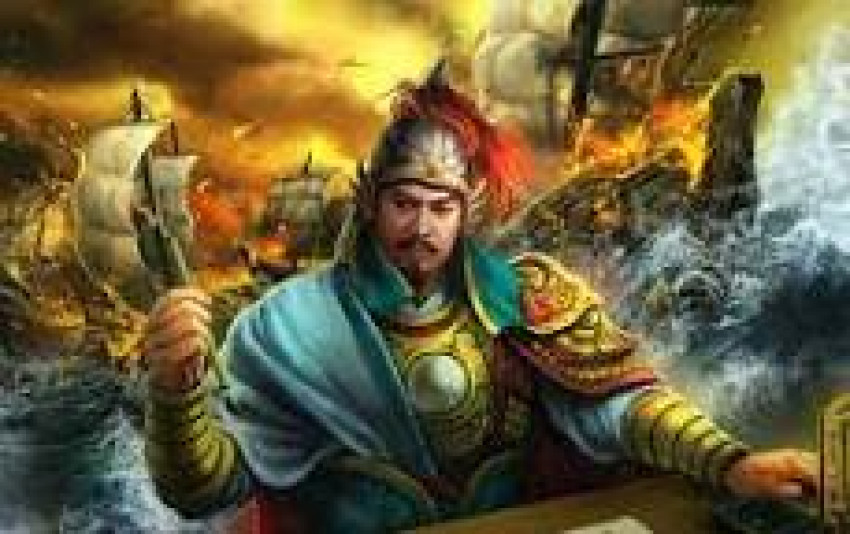
Over tens of thousands of years of human history, many brilliant and talented generals have appeared. They are military geniuses who can change the world order. War is a part of history, it has caused death and great loss to human history. Besides, war is also the cradle of many heroes.
Julius Cesar
Gaius Julius Caesar (July 12, 100 BC - March 15, 44 BC) was a Roman general and statesman who played a key role in the events that led to the fall of the Roman Republic and the fall of the Roman Republic. Rise of the Roman Empire. Born into the family of Julia, one of the great aristocratic lines in Rome, Caesar was exposed and started participating in political life very early. In 60 BC, he together with Crassus and Pompeirus (Pompey) founded the First Triumvirate, a political alliance that would dominate Rome for many years. Caesar's way of building power on populist methods touched and led to opposition from the ruling aristocracy in Rome, led by Cato the Younger with Cicero's frequent support. Caesar's successful conquests in Gallia opened the way for Rome to access the Atlantic Ocean. Julius Caesar is credited with being the first Roman general to successfully build a bridge over the Rhein in 55 BC and becoming the first Roman general to cross the English Channel and launch an invasion of Britannia.
Caesar's great military successes brought him ultimate military power; threatened the position of Pompey, who sided with the Senate after Crassus' death at the Battle of Carrhae in 53 BC. After the war of Gaule came to an end, Caesar was ordered to give up military command and return to Rome. Caesar disobeyed this order and instead left his jurisdiction, crossing the Rubicon River into Rome with a Roman legion in 49 BC. As a result, civil war broke out in Rome, with the final victory going to Caesar. After coming to power in Rome, Caesar began a series of social and governmental reforms, including the creation and adoption of the Julian calendar. In addition, he conducted centralization of power for the republican government and became a Dictator perpetuo (Dictator for life) with many unprecedented powers. However, the political conflicts remained unresolved, and on Idus Martiae (March 15, 44 BC), a group of rebellious Senators led by Marcus Junius Brutus successfully attempted to assassinate Caesar. This led to a series of civil wars that followed in Rome, ending with the Republican government never being restored and Gaius Octavius Octavianus, grandson and heir, being restored. appointed by Caesar, assumed absolute power with the title of Augustus after defeating all other opponents. Augustus' consolidation of power marked the beginning of the Roman Empire.
Genghis Khan
Genghis Khan (1162 - 1227) was a Mongol Khan and founder of the Mongol Empire after uniting independent tribes in Northeast Asia in 1206. He was one of the military's most prominent military leaders. most prominent and influential in the history of the world, respected by the Mongols, as the leader who brought about the unity of Mongolia. His grandson and later successor, Kublai Khan founded the Yuan dynasty of China. In October of the 3rd year of Chi Nguyen (1266), Kublai Khan honored Genghis Khan with the title of Thai To, so he was also called Nguyen Thai To. Thuy's name was then honored as Thanh Vu Emperor. In the 2nd year of Chi Dai (1309), Nguyen Vu Tong became Phap Thien Khai Van. From then on, his posthumous title was Phap Thien Khai Van Thanh Vu Emperor.
Genghis Khan's conquests throughout Eurasia to expand his territory brought unity and development of trade, and he also implemented a policy of religious freedom. However, Genghis Khan was also known for his brutality with opponents. Genghis Khan is seen by many peoples as the embodiment of brutality, especially from Central Asia, Eastern Europe and the Middle East (where the Mongol army was massacred). It is estimated that Genghis Khan's army killed more than 40 million people in the territories they invaded. There are many famous figures believed to be descendants of Genghis Khan, such as Timur Lenk, the conqueror of the Turks; Babur, the founder of the Mongol Empire in Indian history. Other descendants of Genghis Khan continued to rule Mongolia until the seventeenth century, until it was re-ruled by the Manchu Manchu empire of Great Qing.
Hung Dao Vuong Tran Quoc Tuan
Tran Hung Dao (1228 - 1300) real name Tran Quoc Tuan, title Hung Dao Dai Vuong, was a politician, military man, Dai Viet royal family in the Tran dynasty. He is known in Vietnamese history for leading the army to defeat two invasions of the Yuan - Mongols in 1285 and 1288. Most historical and folklore research documents later often use the name. briefly "Tran Hung Dao" instead of the full name "Hung Dao Dai Vuong Tran Quoc Tuan", which includes the title ordained for him. He is one of 14 typical heroes of the Vietnamese nation. The son of Prince An Sinh Vuong Tran Lieu and grandson of Tran Thai To, Tran Hung Dao had a close relationship with the Tran royal family, and King Tran Nhan Tong called him uncle. In 1257, he was appointed a general by King Tran Thai Tong to command the forces on the border to fight the invading Mongols. After that, he retired to the fief in Van Kiep. By the 10th lunar month of 1283, the Yuan (after the Mongols reunified China) threatened to attack Dai Viet for a second time, and Hung Dao Vuong was succeeded by the Supreme Emperor Tran Thanh Tong, and King Tran Nhan Tong (who were cousins and cousins, respectively). his nephew) was ordained as the Duke of moderation, and commanded the army of the whole country. In this position, in 1285, he led troops to stop the invading army led by the ninth prince Thoat Hoan.
After the initial defeats, the Vietnamese army and people under the leadership of two kings Tran, Senior Lieutenant General Tran Quang Khai and Hung Dao Vuong counter-attacked strongly, destroying the Nguyen army in the battles of Ham Tu, Chuong Duong, Truong Yen. , Van Kiep ... completely drove the Yuan army from the border. In 1288, the Yuan army returned to invade Dai Viet for the third time. When he continued to be conferred the title of National Duke, he was restrained; Hung Dao Vuong affirmed to King Tran Nhan Tong, "This year, we will fight the idle enemy". He successfully applied Ngo Quyen's tactics, completely defeated the Nguyen navy led by generals Phan Tiep and O Ma Nhi in a naval battle on the Bach Dang river, forcing the Nguyen army to withdraw back to the country and forever. abandoned their ambition to annex the South. In the fourth lunar month of 1289, Tran Nhan Tong officially conferred him as "Great King", although the position of head of the court at that time still belonged to Senior Lieutenant General Chieu Minh Dai Vuong Tran Quang Khai. After that, he retired to Van Kiep until his death in 1300. Before his death, he advised Tran Anh Tong: "You must drill down to the people's strength to make a deep-rooted successor". In addition, he left behind classic works such as Hich General Sac, Binh Thu Compendium and Van Kiep Tong Esoteric Letter, which laid the foundation for Vietnamese military art from the Tran dynasty to the present day.
rankdlerandkle






